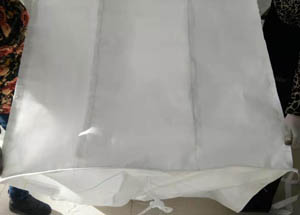
When grootmaat sak and sling are connected, daar sal in die toekoms baie vorms wees, en die verbindingsmodus is ook spesiaal. Dus, wat is die proses van verbinding? Die gedetailleerde ontleding van grootmaat sakvervaardigers is soos volg:
When the sling is connected with the bag body, there are various forms such as top lifting, bottom lifting, side lifting, ens. and they are connected by suture, so the future is also very important. Only with the high strength of sling, the base cloth and suture can not reach a certain strength, nor can they ensure the overall high performance of the bulk bag.
Bulk bag mainly contains massive, granular or powdery objects, and the physical density and lose a degree of the contents have different effects on the overall results.
As for the basis for judging the performance of the grootmaat sakke, it is necessary to test the product close to the customer’s load as much as possible. Dit is die “standard filler specially used for testing” in die standaard geskryf, so as to make the technical standard meet the challenge of the market economy as much as possible.
Oor die algemeen, there is no problem with the bulk bag through a lifting test. There are only two situations when the bags fall down in the hoisting of the port, railway, and truck: one is the operation is wrong, and the other is that this kind of bulk bag fails to pass the hoisting test.
For a bulk bag with a safety factor of more than 5 times, two or one of the four rings must have the tensile performance of more than twice and a half of rated load. Even if two slings are disconnected, the whole bulk bag will not have problems.
Bulk bag products are widely used, especially for packing bulk cement, graan, chemical raw materials, feed, starch, minerals and other powder, granular objects, even dangerous goods such as calcium carbide, which are very convenient for loading, unloading, transportation, en berging.
Huidiglik, bulk bag products are in the rising stage of development, especially the bulk bag in the form of one ton and one pallet (one pallet for one grootmaat sak, or four), which is more popular.

